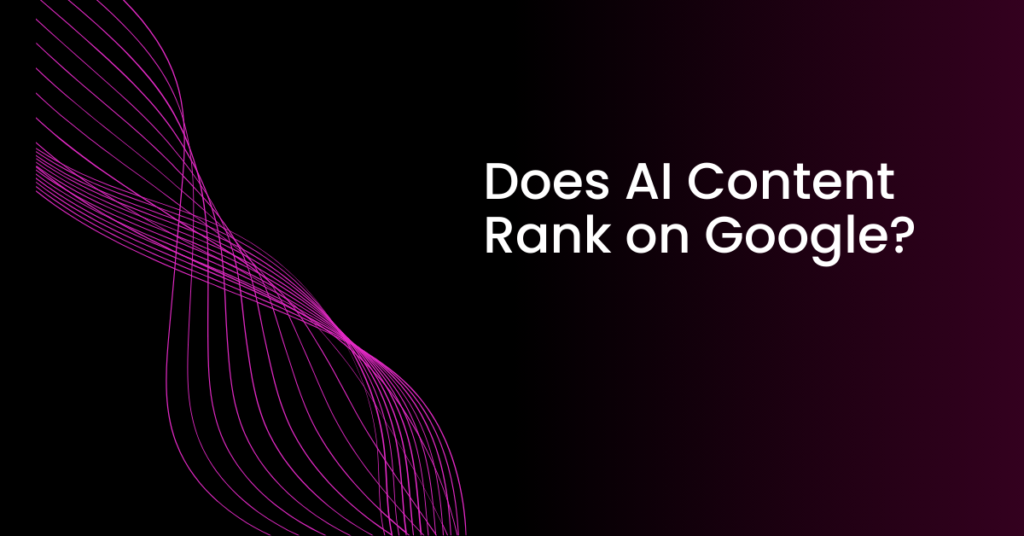In the world of digital marketing and SEO, content is the key to ranking high on Google. With the rise of AI-powered writing tools, many businesses and content creators are turning to artificial intelligence for blog posts, website content, and even social media updates. But an important question remains: Does AI content rank on Google?
The answer isn’t as simple as “yes” or “no.” Google’s algorithms prioritize high-quality, valuable content that meets user intent. If AI-generated content meets these criteria, it can rank well. However, there are some important considerations to keep in mind. In this blog post, we’ll explore how AI content affects SEO, whether Google supports AI-generated content, and how to optimize AI-written content to rank higher in search results.
Does Google Allow AI-Generated Content?
Yes, Google allows AI-generated content, but with conditions. Google has made it clear that it does not penalize AI-written content as long as it follows best practices and provides real value to users. In fact, in Google’s Search Central Blog, the company stated:
“Using automation—including AI—to generate content with the primary purpose of manipulating search rankings is a violation of our spam policies. However, using AI responsibly to create helpful, people-first content is acceptable.”
This means that AI content can rank on Google if it is high-quality, well-researched, and provides value to readers. Simply generating content with AI for the sake of ranking without ensuring quality can get flagged as spam.
How to Make AI Content Rank on Google
If you’re using AI-generated content for your website, it’s essential to follow SEO best practices to improve your chances of ranking. Here are key strategies:
1. Focus on High-Quality, Helpful Content
Google’s Helpful Content Update prioritizes content that is useful, engaging, and relevant to users. AI tools can generate content quickly, but you should always review and refine the text to ensure it meets E-E-A-T (Experience, Expertise, Authoritativeness, Trustworthiness) guidelines.
Tips:
✔ Edit AI-generated content to add depth and value.
✔ Ensure the information is accurate and up-to-date.
✔ Avoid keyword stuffing and unnecessary fluff.
2. Optimize for SEO
Even AI-generated content needs proper SEO optimization to rank on Google.
Key SEO elements to include:
✔ Target Keywords: Use relevant keywords naturally within the content.
✔ Meta Titles & Descriptions: Write compelling, keyword-rich meta tags.
✔ Internal & External Links: Link to high-authority sources and other relevant pages on your site.
✔ Header Tags (H1, H2, H3): Structure content properly for better readability and SEO.
✔ Alt Text for Images: Optimize images with descriptive alt text.
3. Add a Human Touch
AI content can sometimes sound robotic or lack personality. Adding a human touch improves engagement and builds trust with readers.
How to humanize AI content:
✔ Rewrite sections to improve readability and tone.
✔ Include personal experiences, expert insights, or storytelling elements.
✔ Use conversational language and break complex topics into digestible parts.
4. Ensure Content Uniqueness
Google penalizes duplicate or low-quality content. While AI-generated content is unique, it’s essential to run plagiarism checks and make edits to ensure originality.
Tools to check uniqueness:
-
Copyscape
-
Grammarly Plagiarism Checker
-
Quetext
5. Improve Readability & Engagement
AI-generated content can sometimes lack flow and coherence. Ensuring readability is key for user retention and SEO ranking.
Best Practices for Readability:
✔ Use short sentences and paragraphs.
✔ Add bullet points and numbered lists.
✔ Break up text with subheadings and visuals.
✔ Use clear, simple language.
6. Monitor Performance and Optimize Regularly
SEO is not a one-time task. Regularly tracking AI-generated content performance helps you optimize it for better ranking.
SEO tools to monitor performance:
-
Google Search Console (track rankings, impressions, and clicks)
-
Google Analytics (analyze traffic and user behavior)
-
Surfer SEO (optimize content for better rankings)
-
Ahrefs / SEMrush (keyword tracking and backlink analysis)
Does AI-Generated Content Perform Well in Search Rankings?
AI-generated content can rank on Google, but its performance depends on several factors:
-
Content Quality: AI content must be informative, engaging, and valuable.
-
SEO Optimization: Proper use of keywords, headings, and meta descriptions improves rankings.
-
User Experience: If readers find your content helpful and engaging, they’ll spend more time on your page, reducing bounce rates and improving rankings.
-
Updates & Maintenance: Regularly updating AI-generated content helps keep it relevant and fresh.
Many websites successfully rank AI-generated content by combining AI efficiency with human oversight and SEO best practices.
AI Content vs. Human-Written Content: Which Ranks Better?
| Criteria | AI-Generated Content | Human-Written Content |
|---|---|---|
| Speed | Fast, generates content instantly | Takes time for research & writing |
| SEO Optimization | AI tools can optimize keywords but may lack depth | Writers understand keyword intent & user experience |
| Creativity & Personalization | Lacks originality & emotional connection | High creativity, engaging, and personalized |
| Accuracy & Expertise | May include factual errors, needs human editing | Based on experience, research, and expert insights |
| Google Ranking Potential | Can rank well if optimized properly | Tends to rank better due to depth & engagement |
Should You Use AI for Content Creation?
Yes, AI is a valuable tool for content creation, but it should be used wisely. Many businesses successfully use AI for:
✔ Drafting blog posts (which are later edited by humans).
✔ Generating SEO-optimized content outlines.
✔ Producing bulk content for FAQs, product descriptions, and meta descriptions.
✔ Content repurposing (e.g., turning long articles into social media posts).
However, relying solely on AI without human intervention can result in low-quality, generic content that struggles to rank well.
Final Verdict: Can AI Content Rank on Google?
✅ Yes, AI content can rank on Google—but only if it’s high-quality, valuable, and optimized for search engines. Google doesn’t discriminate against AI-generated content, but it does prioritize content that meets user intent, SEO best practices, and E-E-A-T guidelines.
To maximize success, businesses should use AI as a tool rather than a full replacement for human writing. A hybrid approach, where AI is used for efficiency and humans refine the content for quality, creativity, and SEO, is the best strategy to ensure ranking success.
Need Help Creating SEO-Optimized AI Content?
If you’re looking to scale your content strategy while maintaining quality, consider using AI-powered writing tools like Jasper, Writesonic, or Copy.ai—combined with human editing to ensure the best results!



